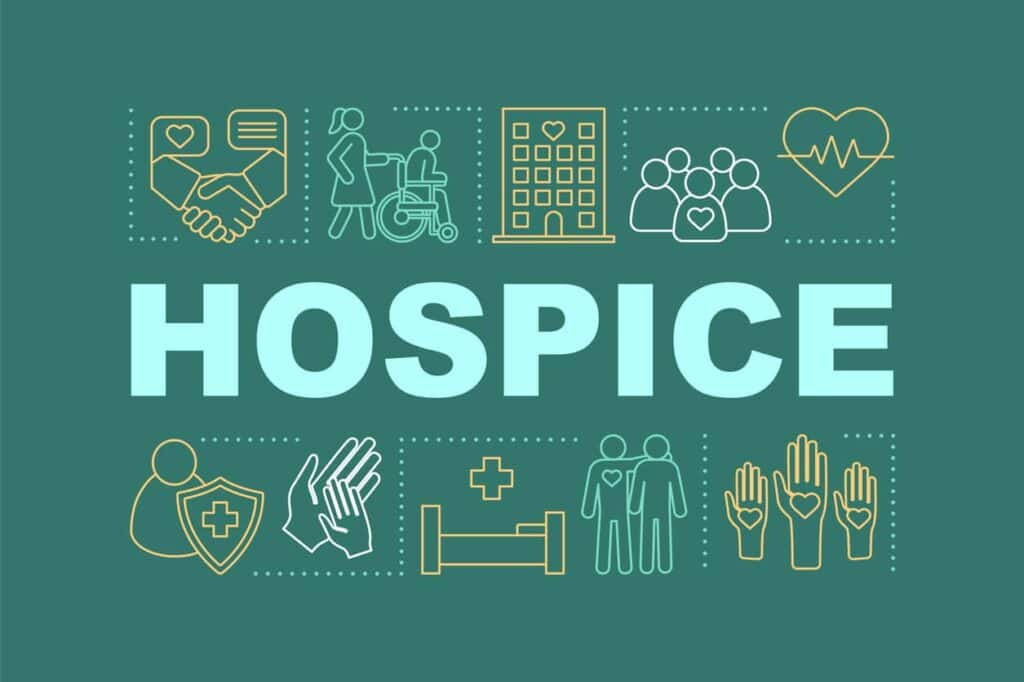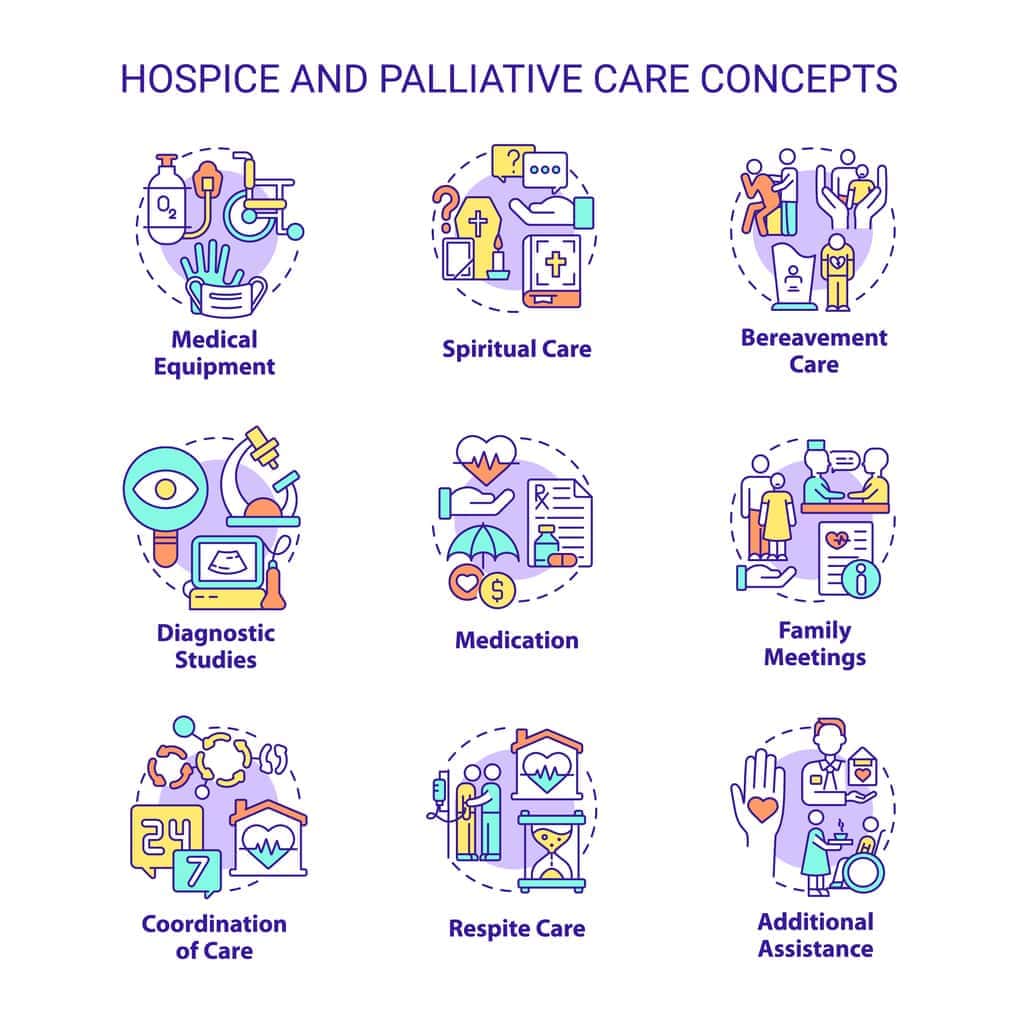
Facing the reality of a loved one’s life journey nearing its end is overwhelming, isn’t it? Deciding on hospice care is a profound step, filled with love, respect, and the desire for peace. But what exactly does this transition look like?
As difficult as this decision may seem, hospice care always prioritizes the comfort and care of your loved ones. Together, let’s explore this journey with compassion and knowledge, ensuring peace of mind for you and your family.
What is Hospice Care?
Hospice care is a specialized type of care designed to provide comfort and support to patients during the end-of-life phase. When your loved one’s life expectancy is considered to be six months or less, it may be time to start hospice.
Unlike curative treatments, hospice focuses on enhancing the quality of life, managing pain, and offering emotional support. It’s a holistic approach that involves a care team, including healthcare professionals, hospice nurses, and caregivers, all working together to care for your loved one.
Palliative Care vs. Hospice Care

It’s crucial to understand the distinction between palliative care and hospice care, as they are often mistakenly considered the same.
Palliative care is a broader term that encompasses relieving symptoms and stress at any stage of a serious illness, not just at the end of life. It can be provided alongside curative treatments.
Hospice care, however, is a form of palliative care that begins after the decision has been made to stop curative treatments for those with a life expectancy of six months or less. Hospice focuses solely on comfort care. When it’s time for hospice, the care plan shifts to make the most of quality time left. Hospice care also ensures the patient’s needs are met compassionately and comprehensively.
Common Misconceptions
One of the most prevalent misconceptions about hospice care is the belief that it hastens death. That’s not entirely true. Hospice care aims to provide the highest quality of life for the remaining days, not to shorten life. The care team focuses on managing symptoms so the patient can spend time with loved ones comfortably. It’s about cherishing quality time and making meaningful memories, rather than giving up.
Another misunderstanding is that hospice is only for cancer patients. In reality, hospice care can help anyone with a terminal illness, including those with cardiac conditions, kidney failure, lung conditions, dementia, and many other illnesses. It’s about offering a support system to patients and families. It guides them through care decisions and ensures the patient’s care aligns with their wishes and needs.
When Does Hospice Care Start?

Not sure if now is the time for hospice care? Here are key signs and indicators that suggest it might be time to consider hospice services for a loved one:
Declining Ability to Perform Daily Activities
Your loved one might need more help with personal care, such as eating, dressing, using the bathroom, or moving around when they are terminally ill. If that’s so, it could be time to get to know more about hospice care options.
Increased Pain and Discomfort
Your elderly loved one is suffering from long-term or terminal illnesses and experiencing more pain or discomfort that isn’t relieved by standard treatments. This might indicate it’s time to consider specialized hospice care.
Frequent Hospital Visits
An increase in hospital stays or visits to the emergency room can be a clear sign for hospice care. If your loved one’s condition is deteriorating, you should consult your doctor about the need for hospice care.
Changes in Mental Abilities
You might observe noticeable declines in the cognitive function of your loved one, such as confusion, forgetfulness, or difficulty comprehending situations. These signs suggest it may be time to talk about hospice care options with a doctor.
Shift in Treatment Goals
When the focus shifts from seeking curative treatments to wanting quality of life and comfort, this is about time to consider hospice.
Doctor’s Recommendation
Another indicator may be a recommendation from a health care professional or a hospice care professional. They might let you know that your loved one has a life expectancy of six months or less.
Wish of the Loved One
The person with cancer or a terminal illness may express a desire to stop curative treatments and focus on quality of life. It’s an important time to respect their wishes and explore hospice care options.
Initiating Conversations About Hospice Care

Discussing hospice care with a loved one or a doctor can be a challenging yet important conversation.
Here’s guidance on how to approach these discussions with your loved ones thoughtfully.
- Choose the Right Time and Place: Find a quiet, comfortable setting where you can talk without interruptions. Ensure it’s a time when you and your loved one feel most at ease and they are ready for a heart-to-heart conversation.
- Express Your Concerns Gently: Start by sharing your observations and concerns about their health and well-being. Use compassionate and supportive language to show your love and desire for their comfort and quality of life.
- Introduce the Concept of Hospice Care: Explain hospice care as an option that focuses on their comfort, quality of life, and support. Highlight the benefits of hospice care, such as personalized care plans, pain management, and emotional support.
- Listen and Respect Their Wishes: Be prepared to listen to their feelings and concerns. It’s essential to respect their perspective, whether they’re ready to consider hospice or not. The goal here is to open a dialogue and make informed decisions together.
When and Why a Doctor May Recommend Hospice Care
Doctors recommend hospice care when they believe that a patient’s condition is terminal, with a life expectancy of six months or less, and when further curative treatments are unlikely to be beneficial. The recommendation comes from a place of compassion. They want to provide maximum comfort and support to your loved ones through specialized care.
Engaging in conversations with healthcare providers provides valuable insights and information about hospice. It helps you and your family make informed care decisions that align with your loved one’s wishes and needs. Starting these conversations can be difficult, but they’re crucial in ensuring your loved one receives the most appropriate and compassionate care.
Benefits and Services of Hospice Care

Hospice care offers a compassionate approach to end-of-life care. This specialized care brings numerous benefits to patients and their families. Let’s dig a little deeper into the benefits and services offered by hospice care:
Personalized Care Plans
Every patient receives a care plan tailored to their specific needs and preferences. This personalized approach ensures that care decisions align with the patient’s and family’s desires.
Symptom and Pain Management
One of the core benefits of hospice care is its focus on managing symptoms and pain effectively. The hospice team, including doctors and nurses specializing in pain management, works to ensure patients remain as pain-free and comfortable as possible.
Emotional and Spiritual Support
As end-of-life care impacts emotional and spiritual well-being, hospice services also include support from social workers, counselors, and chaplains. This holistic approach helps patients and families find peace and comfort during challenging times.
Support for Families and Caregivers
Hospice care extends its support to families and caregivers, offering guidance on how to care for their loved ones and cope with expected challenges. Many hospice care services offer respite care to provide caregivers with necessary breaks.
Coordination of Care
The hospice team coordinates all aspects of the patient’s care, including medication management, medical equipment, and personal care needs. This coordinated effort ensures a seamless care experience for the patient and family.
24/7 Availability
Hospice teams are available 24 hours a day, seven days a week, to provide care and support as needed. This round-the-clock availability offers peace of mind to patients and families, knowing help is always just a call away.
Bereavement Support
Before and after the loss of a loved one, hospice care continues to support families through bereavement services. Counseling and support groups help families process their grief and begin the healing process.
Cost Coverage by Insurance
The cost of hospice care is often covered by Medicare, Medicaid, and most private insurance plans, reducing the financial burden on families during this difficult time.
Making the Transition to Hospice Care

Transitioning to hospice care is challenging, but it is a significant time to bring comfort and peace to the final chapter of your loved one’s life. Here’s how you can deal with this transition with the compassion and sensitivity it demands.
Understand the Transition
The shift to hospice care changes the focus from curative treatments entirely to comfort and quality of life. Its goal is to make your loved one’s remaining time as comfortable and meaningful as possible. It emphasizes personal care and the alleviation of pain and discomfort.
Communicate Openly and Compassionately
Start conversations with your loved ones about the transition with openness, honesty, and empathy. Acknowledge the difficulty of this transition, but also discuss the benefits of hospice care with them.
Involve the Care Team Early
Early involvement of the hospice care team can provide reassurance and clarity. These professionals are skilled in handling the challenges that come with end-of-life care. They can offer invaluable guidance to both patients and families to help ease their fears and concerns.
Seek Support for Yourself
As your loved ones go through this transition, remember to seek support for yourself as well. The emotional toll of preparing for a loved one’s end of life can be overwhelming. Reach out to support groups, counselors, or friends who can offer comfort and assistance during this challenging time.
Take Time to Understand Hospice Benefits
Educate yourself and your family about the full range of services and support hospice care provides. Make them understand that your loved ones will receive round-the-clock care, pain management, and emotional and spiritual support.
Prepare for Quality Time
Embrace the transition to hospice care as an opportunity to spend quality time with your loved ones. Recall memories, express love and gratitude, and share moments of joy and peace together.
Respect Your Loved One’s Wishes
Respect your loved one’s wishes and decisions throughout the process. This respect and understanding can make the transition smoother and more peaceful.
Financial Considerations and Coverage for Hospice Care

You need to understand the financial aspects of hospice care to make an informed decision.
Eligibility
Here’s what you need to know about Medicare eligibility and coverage of hospice care:
Medicare Part A covers hospice care for individuals who meet certain conditions:
- Both the patient’s hospice doctor and their regular doctor must certify that the patient is terminally ill, with a life expectancy of 6 months or less.
- The patient must prefer comfort care over curative treatments.
- A consent form must be signed by the patient or their guardian choosing hospice care for their disease/condition.
Original Medicare offers the following coverage:
- There are no charges for hospice care services.
- Patients might pay up to $5 for outpatient prescription drugs for pain management.
- There may be a copayment of up to 5% of the Medicare-approved amount for inpatient respite care.
- It’s important to note that Medicare does not cover room and board if the patient receives hospice care at home or nursing home unless it’s a short-term stay arranged by the hospice team.
Coverage
Medicare’s hospice benefit is designed to offer comprehensive support to the patient. Services, that are covered, include:
- Doctor services, nursing care, and medical equipment for pain relief and symptom management.
- Medications for symptom control or pain relief.
- Hospice aide and homemaker services, physical and occupational therapy, and speech-language pathology services.
- Social worker services, dietary counseling, and spiritual and grief counseling for the patient and family.
- Short-term inpatient and respite care for symptom management and caregiver relief
Patients and families need to communicate closely with their healthcare providers to understand the full scope of hospice benefits available to them and any associated costs.
Choosing the Right Hospice Care Option
When the time comes to choose hospice care for your loved ones, you need to know about your options and what each one of them offers. This decision is deeply personal. Hence, it should reflect the patient’s needs, family preferences, and the level of care required. Let’s explore the different hospice care settings.
- In-Home Care: In-home care is often preferred by many families and patients. That’s because it allows the patient to remain in a familiar and comfortable environment. This setting is supported by a visiting hospice team at the patient’s home.
- Inpatient Hospice Facilities: These facilities are equipped to handle more complex medical needs that cannot be adequately managed at home. They offer a peaceful setting where patients can receive around-the-clock care.
- Hospitals: Some hospitals also have a specialized hospice unit. They are a good option when a patient needs temporary intensive care to manage symptoms before returning to home care or an inpatient facility.
- Assisted Living Homes: Patients residing in an assisted living home can also receive on-site hospice care in their familiar setting.

Considerations While Selecting a Hospice Care Provider
When you look for hospice care options, you must consider the following factors to make the right choice for your loved ones:
- Look for a hospice care service that has good reviews for offering compassionate, high-quality care. You can ask for references from their previous clients, or read online reviews and testimonials. Care Compare website from the Centers for Medicare and Medicaid also offers quality ratings you can check.
- Make sure the service provider offers the range of services your loved one needs. It may include pain management, symptom control, emotional and spiritual support, and bereavement services for the family.
- The provider should offer 24/7 access to care. This is crucial for providing peace of mind to the patient as well as to the family.
- Verify that the hospice is approved by Medicare or your insurance provider and get an estimate of any potential out-of-pocket costs.
- Check for any accreditations by a recognized body. They can be a sign of quality and compliance with best practices in hospice care.
- The hospice team should be respectful of and align with the patient’s wishes and family’s cultural, religious, or personal preferences.
- Consider how easily family members can visit the patient, especially if choosing an inpatient facility.
Making the right choice involves gathering information, asking questions, and, most importantly, considering what will best support your loved one’s comfort and dignity during this phase.
Conclusion
Choosing hospice care is an important decision. It demands compassion, understanding, and assurance of comfort and dignity for your loved one.
In this article, we’ve discussed the essential considerations for hospice care, from recognizing when it’s time to start, to selecting the appropriate setting for their care. It’s about making the remaining time as meaningful and comfortable as possible, surrounded by love and care.
Looking for top-quality hospice care? Amy’s Eden Senior Care is a choice, many people trust. Your Comfort, Our Mission. We prioritize comfort, and respect, creating a peaceful environment for your loved ones. It’s our level of care that truly makes a difference. Contact us today to discuss our hospice care options for your loved ones.




